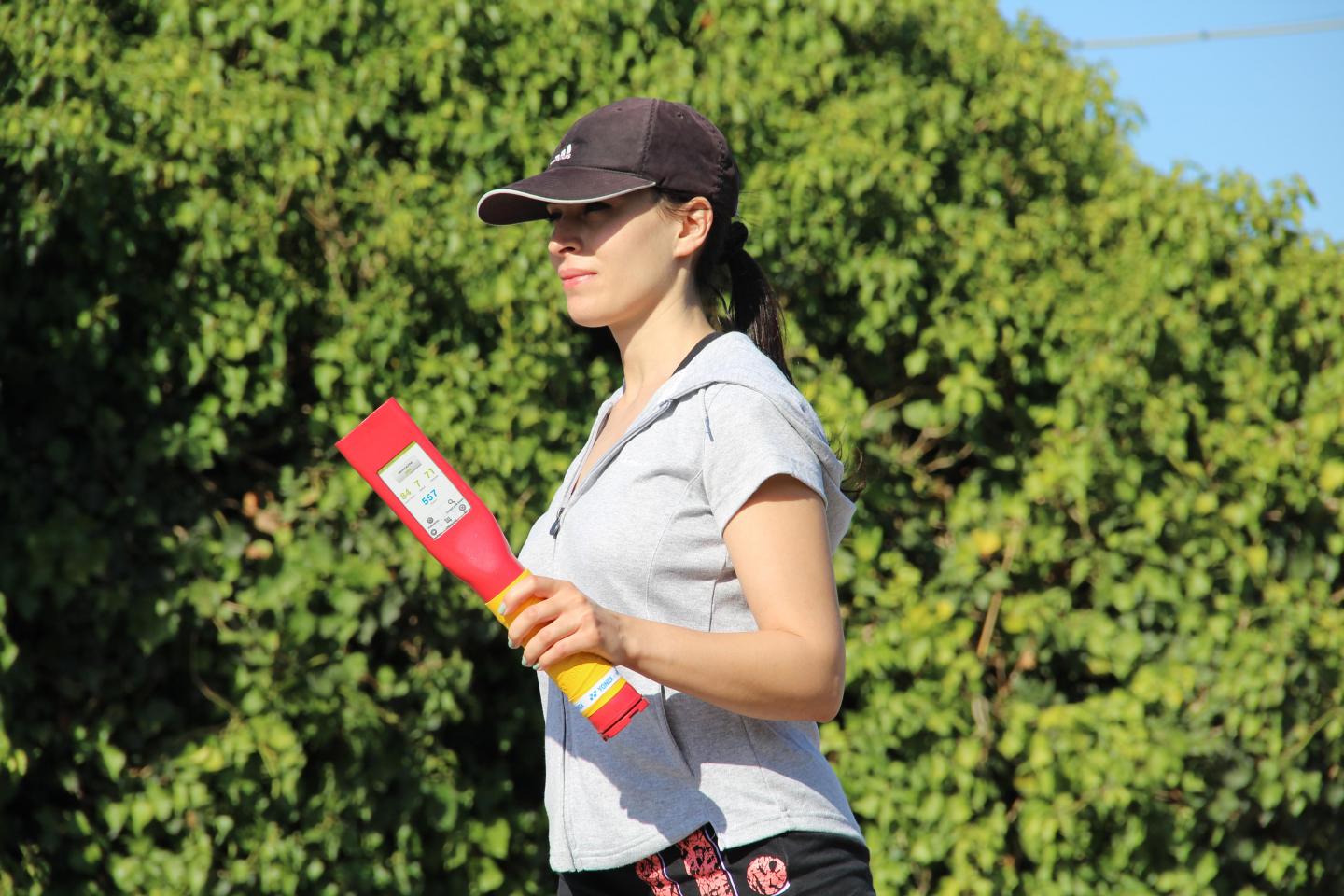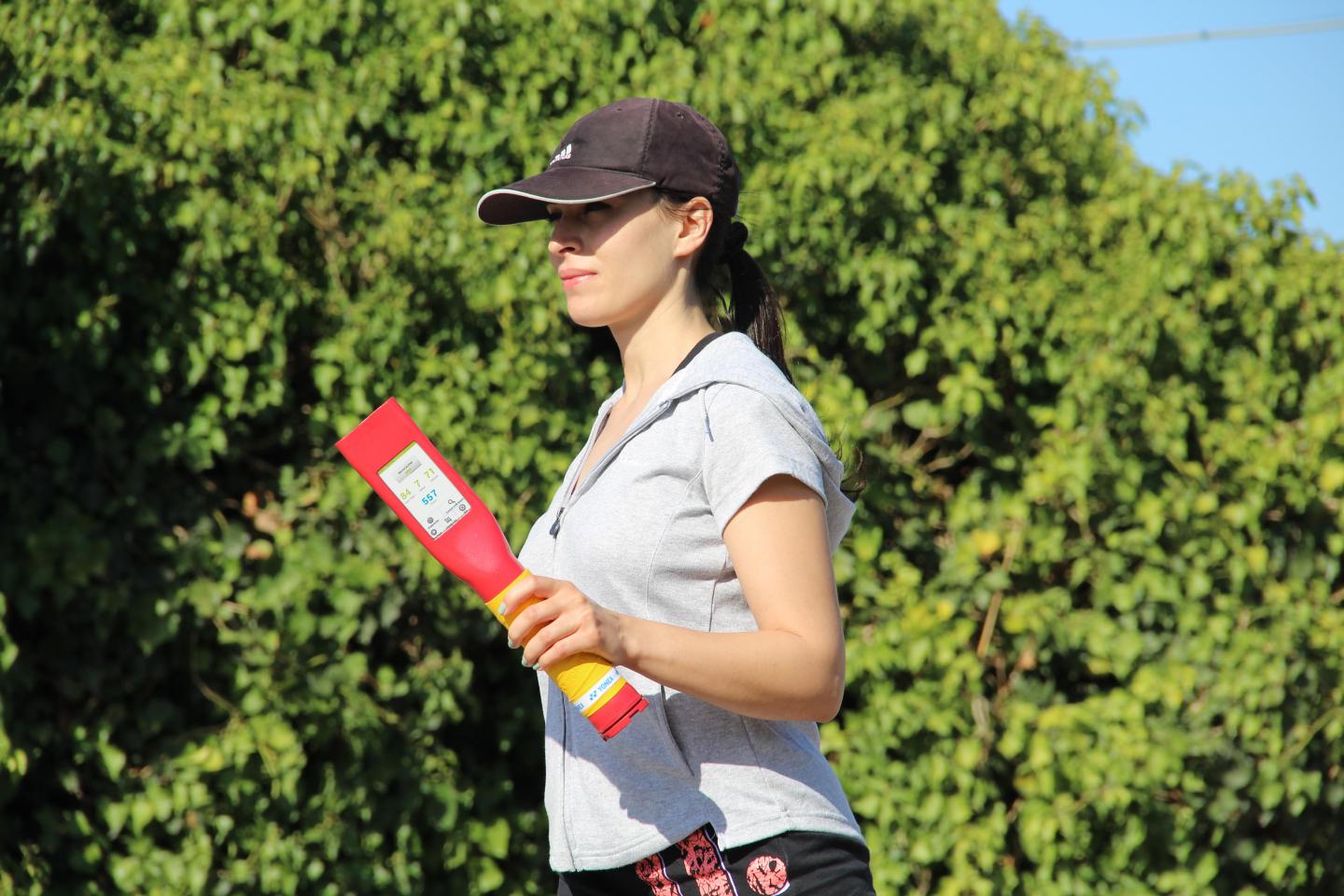
Credit: Dr Franco Curmi
The loneliness of the long distance runner could soon be a thing of the past as new technology allows crowds to cheer on athletes from anywhere in the world.
A prototype digital relay baton has been developed by computer scientists at Lancaster University to allow friends, family and other interested viewers to offer encouragement to weary athletes undertaking challenging events — such as long-distance charity fund-raising runs.
Sporty types, such as runners and cyclists, are used to digital fitness trackers and apps (such as Fitbit and Strava) that enable them to document their activities and allow them to share their exploits with others. However, so far they are predominantly used for performance analysis after the event.
The digital baton, which is detailed in a research paper 'Embedding a Crowd inside a Relay Baton: A Case Study in a Non-Competitive Sporting Activity', which will be presented this summer at the 'CHI17' conference, contains sensors which broadcast information such as location, speed and distance data to a webpage, allowing people to follow the action on their phone, tablet or PC.
In response to the information displayed, which can also include a live map and gradient profile showing upcoming hills, followers are able to click on a cheer button which makes the baton vibrate and also calls out the name of the person cheering so it can be heard by the athlete – spurring them on.
The baton was tested by a team from Lancaster University's Running Club who ran the 170-mile 'Way of the Roses' long-distance route across England from Morecambe, Lancashire, to Bridlington, Yorkshire, in less than 24 hours. This event, in which 13 athletes took turns running five-mile legs, was challenging in physical terms, but also mentally due to periods of loneliness while running across isolated Pennine moorland and in the dark.
The event saw 261 spectators submit 3,153 cheers, despite 12 live data drops – mostly due to limited mobile network coverage. The athletes carrying the digital baton found the remote cheers motivating.
"In this sort of event, where it is a very lonely event because it is just you and the (safety) cyclist remote support is helpful," said one. "You have done so many miles, and you may be really struggling and that support is just what you need," said another.
The study found that remote followers were also keen to support athletes during particularly difficult parts of their challenge, with spikes in the number of cheers happening on tough hills. "We started the hill and at the top of the hill we got so many more cheers. It was quite remarkable," said one athlete.
Researchers believe the technology has more potential for sporting events where there are fewer possibilities for crowds to line the route, and so where loneliness is a bigger issue.
"We clearly observe that the awareness of remote crowd-following is most relevant when the athlete is feeling lonely, rather than in contexts where the athlete has a crowd of cheering spectators along the course," said Lancaster University's Dr Curmi, lead author of the paper. "This promises most relevance in sporting contexts such as fell (hill) running, long-distance cycling or ultra-marathons."
As well as benefitting athletes, and remote spectators the researchers noticed benefits to event organisers as the engagement channel can be used to increase event awareness and web traffic to the charity page.
The digital relay baton prototype is a step towards understanding how technology that enables crowd support can be designed into products.
"Our work with the digital relay baton takes an exploratory design approach to bring new insights into the design of real-time technology-enabled social support," said Dr Curmi.
Researchers' future work in this area will look at reducing the size and weight of remote crowd-cheering devices. Additional features, such as live video broadcasts are also being looked at.
###
The research formed part of the HighWire Centre for Doctoral Training at Lancaster University, which was funded by the UK Digital Economy Programme. Other HighWire projects have included ubiquitous display technologies and examining how computing can be taught effectively in small rural primary schools.
Researchers on the project included Dr Franco Curmi, Dr Maria Angela Ferrario and Professor Jon Whittle, all of Lancaster University's School of Computing and Communications.
Digital Economy
Supporting research to rapidly realise the transformational impact of digital technologies on community life, cultural experiences, future society, and the economy.
We bring together a unique community of researchers and users to study, understand and find solutions to real problems. Relevant researchers are from a diverse range of disciplines including social science, engineering, computer science, the arts and medical research.
EPSRC leads the RCUK Digital Economy Theme on behalf of Research Councils UK.
Media Contact
Ian Boydon
[email protected]
01-524-592-645
http://www.lancs.ac.uk
############
Story Source: Materials provided by Scienmag





